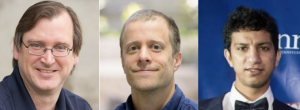In September, the U.S. Department of Energy (DOE) announced $65 million in funding for research to advance quantum computing at more than 20 institutions across the nation.

Among the awardees were three scientists at DOE’s Argonne National Laboratory. The researchers will lead Argonne teams that are contributing to multi-institutional projects focused on quantum algorithms and software, demonstrating quantum computing’s capability for solving scientific research problems.
The DOE initiative aims to propel the development of quantum technologies, which have the potential to transform fields such as energy, medicine and national security.
“With these awards we are equipping scientists with computational tools that will open new frontiers of scientific discovery,” said Ceren Susut, DOE associate director of science for the Office of Advanced Scientific Computing Research. “Quantum computers may ultimately revolutionize many fields by solving problems that are currently out of reach.”
The Argonne awardees are:
- Paul Hovland: His project, MACH-Q (Modular and Error-Aware Software Stack for Heterogeneous Quantum Computing Ecosystems), focuses on creating a modular software framework designed to improve the performance and reliability of quantum computing systems. The goal is to address the significant issue of errors in quantum computation, developing tools to optimize performance and make the technology more scalable. Lawrence Berkeley National Laboratory is the lead institution for MACH-Q.
- Jeffrey Larson: Awarded for his work on FAR-Qu (Fundamental Algorithmic Research towards Quantum Utility), Larson’s research focuses on developing algorithms that can fully exploit quantum systems’ potential. This includes advancing hybrid quantum-classical algorithms that could solve some of the most complex computational problems faster than traditional methods. Sandia National Laboratories is the lead institution for FAR-Qu.
- Zain Saleem: Saleem’s project, AQuA-DATA (Advanced Quantum Algorithms for Diverse Applications and Theoretical Advancements in Science), is aimed at creating new quantum algorithms with applications across various scientific fields. His work will contribute to optimizing quantum computation for diverse real-world problems, making quantum technology more accessible for practical use. Lawrence Berkeley National Laboratory is the lead institution for AQuA-DATA.
This funding recognizes the Argonne scientists’ contributions to quantum computing and strengthens Argonne’s role in advancing this transformative technology.
“Our scientists are excited to develop methods to advance the state of the art in quantum computing through collaborative efforts,” said Sean L. Jones, Argonne deputy laboratory director for science and technology. “While there are three distinct projects at Argonne, the researchers will work together to push the boundaries of what quantum technology can achieve and unlock its full potential.”
Website: International Research Awards
#researchawards #DOEAwards #QuantumComputingAwards #InnovationAward #Researcher #Analyst #Engineer #Technician #Coordinator #Specialist #Writer #Assistant #Associate #Biologist #Chemist #Physicist #Statistician #datascientist #consultant #Coordinator #researchscientist #seniorscientist #juniorscientist #postdoctoralresearcher #labtechnician
Visit Our Website : researchawards.net
Nomination link : researchawards.net/award-nomination
Registration link : researchawards.net/award-registration
Member link : researchawards.net/member-submission
Contact Us : contact@researchawards.net
Get Connected Here:
Social Media Link
Blogger : www.blogger.com/blog/posts/7416565241613113643
Twitter : x.com/View85515S
Pinterest : www.pinterest.com/sciencereviewer
Linkedin : www.linkedin.com/feed/?trk=404_page
You Tube : www.youtube.com/channel/UCAByV7Lha4_gObFc33DfgfQ
Comments
Post a Comment